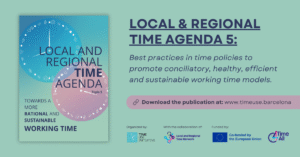- Local and regional institutions from all over Europe and experts ask the new European Commission to reactivate the process to make the end of the seasonal clock change effective by 2026
- Once again, on 27 October, European citizens will turn their clocks back one hour to winter time, “the closest to our natural rhythms”. The clock change continues despite growing evidence that this practice negatively affects public health and the economy.
- The updated action plan of the Barcelona Declaration on Time Policies will be presented on October 21st in Barcelona, during Time Use Week 2024. One of its commitments is ending seasonal clock change in Europe.
- On November 28th, a delegation of members of the Local and Regional Time Network and of the Time Use Initiative will meet the MEPs at the European Parliament in Strasbourg, to ask them to end seasonal clock change in the EU by 2026.
The Barcelona Declaration on Time Policies is a pioneering political declaration, signed by 50 institutions and organisations worldwide in 2022. It aims to develop actions to promote the right to time and time policies on the international and urban political agenda. Since then, all the signatories have worked together in an action plan to develop time policies and the right to time in two main areas: urban and European.
One of the four main working areas was to consolidate a proposal to abolish seasonal changes based on scientific evidence. The signatory organizations of the initial Declaration saw it as important to work on the abolition of the seasonal time change (or Daylight Saving Time) in Europe, based on scientific evidence, and to respect, as much as possible, natural time zones. A specific proposal on how to implement it was elaborated in 2022.
Now, one of the 10 commitments included in the updated plan of the Declaration, already endorsed by 200 organisations and public administrations worldwide, is to ask the European Council to implement this plan to end the clock change in Europe by 2026.
Some of the main organisations signing the Barcelona Declaration are Tempo Territorial, the International Association for Time Use Research (IATUR), the European Biological Rhythms Society (EBRS), the International Alliance for Natural Time (IANT), the European Medical Association (EMA), and many regional and local governments such as the ones from Barcelona, Rennes, Strasbourg, Lille, Milano, Bolzano or Bergamo.
The new action plan of the Barcelona Declaration on Time Policies will be presented on the 21st of October at 12.15 pm (CET) in the frame of the opening event of the Time Use Week 2024. To attend it, presentially or online, a previous registration is required.
EU Manifesto on Time Policies Including the End of the Clock Change
This demand is aligned with the Tick-tock Europe Manifesto on Time Policies, launched by the Time Use Initiative in June 2024, including 12 necessary changes Europe needs to make to ensure the right to time to all Europeans; one of them is the formulation of a roadmap towards ending DST (Seasonal clock change) by 2026. “Seasonal clock change is outdated, and the EU can finally end it. Based on the proposal done by the European Commission in 2018, the European Commission, and especially the EU Council, should propose a roadmap towards ending DST no later than 2026,” states the Manifesto.
The roadmap should be particularly focused on sectors that may expect a higher impact, such as emergency and transport services, to prepare for the change and should be accompanied by a public awareness campaign.
Meeting with MEPs in Strasbourg in November
13 MEPs from the main European Parliament Parties endorsed the Manifesto on Time Policies before the last European Parliament elections in June, showing their commitment to work for the right to time. Now that they have been elected, on November 28th a delegation of Local and Regional Time Network representatives from all over Europe and from the TUI will meet them at the Strasbourg Parliament to ask them to reinforce their commitment towards ending seasonal clock change by 2026, as well as towards implementing the 12 key changes included in the Tick-tock Europe Manifesto.
The meeting is organised in the frame of the events of the municipality of Strasbourg, the current World Capital of Time policies 2024-2025, a title awarded to the city by the International Network for Time Policies, with its Secretariat in Barcelona.
Over the year, events and conferences are organised to raise awareness of the value of time and the right to self-determination over it; more specifically from November 28th-29th, there will be two days of debates, conferences, and workshops to defend the need for the right to time in Europe, taking place at the European Parliament.
Myths on DST
Over the past 30 years, an increasing body of research has revealed the detrimental effects of living in misaligned time zones. These impacts extend beyond failed energy savings to include increased risks of cancer, diabetes, obesity, and metabolic disorders. Studies have also shown negative effects on worker and student performance, as well as overall GDP. Furthermore, living in the wrong time zone can lead to mental health issues, fatigue, lethargy, and decreased concentration. Daylight Saving Time (DST) has been linked to increased photochemical pollution and greenhouse gas emissions (Ozone 03), compounding its negative environmental impact.
Nevertheless, beliefs and myths around the need to maintain Daylight Saving Time (DST) persist in public opinion and political debate. These beliefs are one of the key reasons why the EU has not yet decided on ending clock change, extending the harmful effects it has on most of the population.
Given the current energy crisis, one of the key myths is that DST saves energy. Recent studies point out that either there is no effect, or even worse, DST could be making us spend more energy, given current consumption patterns, which increases the spending on cooling and heating.
Another common myth is that it might hurt the economy, especially in certain sectors such as tourism and leisure or retail. Regarding that argument, there are three issues to take into account. First, the current setup is already hurting the economy by provoking sleep deprivation in a large part of the population, and as a consequence, working people are less productive, have more accidents at work, and take more sick leave. Second, during the work week, there is not much change under DST in terms of commerce, as people have to continue with their set social schedules. But most people sleep in at the weekend to compensate for sleep deprivation, thus having less time to shop. Finally, it is not DST, but summer and the good weather that drives tourism and leisure. Overall, the economy will benefit if DST is abolished and natural time zones are restored.
Finally, some people fear that stopping clock changes would mean they have to change their daily habits. The International Alliance for Natural Time (IANT) reassures that since habits are already constant throughout the year by clock time, they can remain the same. A natural time zone only means that we are adjusting the clock time to reflect the real time of day, which better aligns with our circadian rhythms.
For further resources on the issue, the International Alliance for Natural Time (IANT), in which TUI participates, launched a social media campaign with the most frequently asked questions about changing clocks and living permanently in a natural time zone. Some information might be surprising.






